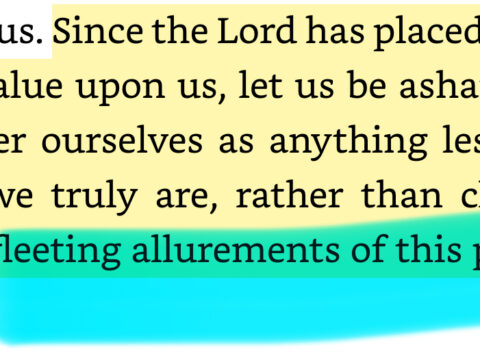
Through the teachings of Scripture, we are not only instructed in the fundamental principles of faith but also guided in the proper use of earthly blessings, a vital aspect that should not be overlooked in shaping our lives. As we navigate this journey of life, we cannot avoid using the necessary provisions for our existence, nor should we completely abstain from those things that bring delight. Instead, we must strike a balance and employ them with a pure conscience, whether for our essential needs or for the enjoyment they bring. The Lord, in His wisdom, reveals to His people that this present life is but a pilgrimage towards the heavenly kingdom. Therefore, it is evident that we should utilize the blessings of this world in a manner that aids our progress rather than hinder it. In light of this, the apostle Paul aptly exhorts us to use the world without abusing it, and to possess material things as though we were not possessed by them (1 Corinthians 7: 30-31). However, as we tread this path, we must be cautious, for it is treacherous ground, and the peril of falling on either extreme side is great.
Let us firmly establish within ourselves this fundamental principle, so that we do not falter in our stewardship of the gifts bestowed upon us by Divine Providence. May we always direct these gifts towards the purpose for which their Creator fashioned and destined them, for He formed them with our well-being in mind, not for our ruin. There is no better guide than the one who keeps this purpose diligently before their eyes. Therefore, as we contemplate the reason behind the creation of food, we will discover that it was designed not only to fulfill our basic needs but also to bring us joy and delight. Likewise, in the realm of clothing, its purpose extends beyond necessity to encompass beauty and honor. Even in the realm of plants, fruits, and trees, their manifold uses are accompanied by the gracefulness of their appearance and the sweetness of their fragrance. Would the psalmist enumerate wine that gladdens the heart of humanity and oil that makes their faces shine among God’s mercies if they were not meant to be enjoyed? Would the Scriptures repeatedly extol His benevolence in providing such things for humankind? The very nature of these gifts indicates their lawful enjoyment and reveals the extent to which they can be appreciated. Did the Lord not adorn flowers with captivating beauty that pleases the eye and fill the air with fragrances that delight the senses? Should we then consider it unlawful to relish in the sight of their beauty and the aroma they emit? Moreover, has He not distinguished certain colors as more pleasing than others? Has He not imbued gold, silver, ivory, and marble with unique qualities, rendering them precious above other metals and stones? In short, has He not endowed countless things with value, even when they lack any inherent necessity?
Let us cast aside that cold-hearted philosophy which, in its inhumanity, restricts the use of God’s creation to mere necessity. This philosophy not only maliciously robs us of the lawful fruits of His abundant goodness, but also seeks to strip humanity of its senses, reducing us to lifeless objects. However, let us also guard ourselves diligently against the temptations of the flesh, for if left unchecked, they will burst through all boundaries. These temptations are advocated by those who, under the guise of liberty, indulge in every kind of excess. Let us first acknowledge that the purpose of all things is to teach us about their Creator and inspire gratitude for His benevolence. Where is the gratitude if we indulge so excessively in feasting and wine that we are rendered unfit for acts of piety or the responsibilities of our vocation? Where is the recognition of God if our flesh, inflamed with lust due to excessive indulgence, contaminates our minds and robs us of the ability to discern honor and righteousness? Where is our thankfulness to God for clothing if we, because of luxurious garments, become conceited and look down upon others? If our love for ostentation and splendor paves the way for immodesty? Where is our acknowledgment of God if our minds are captivated by the allure of these things? Many are so devoted to sensory pleasures that their minds lie buried, and others are so enamored with marble, gold, and paintings that their hearts become cold as stone and they resemble mere painted figures. The aromas of the kitchen seduce them to the point that they lose their spiritual discernment. Similar examples can be found in various aspects of life. Therefore, it is evident that there is a great need to restrain and control these licentious abuses, adhering to the guidance of the apostle Paul: “But put on the Lord Jesus Christ, and make no provision for the flesh, to gratify its desires” (Romans 13: 14). When excessive liberty is granted to these desires, they burst forth without measure or restraint.
There is no surer or swifter path to this than by embracing a disdain for the present life and setting our hearts on celestial immortality. From this foundation, two guiding principles emerge: First, it remains imperative for those who have wives to live as if they had none, and for those who engage with the world to do so without abusing it. (1 Corinthians 7: 29, 31) Secondly, we must cultivate a spirit of tranquility and patience, whether we endure poverty or experience abundance. The one who adheres to the principle of using this world as if not consumed by it not only eradicates all gluttony in relation to food and drink, and all excesses of indulgence, ambition, pride, lavish displays, and unnecessary frugality in matters of sustenance, dwelling, and attire, but also eliminates every care and affection that might divert or impede their pursuit of the heavenly life and the nurturing of their soul’s welfare. Cato wisely observed that luxury begets great anxiety and fosters a profound disregard for virtue. There is an ancient proverb which states, “Those who are overly preoccupied with caring for the body tend to neglect the soul.” Therefore, while a Christian’s liberty in external matters is not strictly bound by rigid regulations, it is nevertheless subject to this law: to indulge as little as possible. Conversely, it is our constant duty not only to restrain extravagance but also to eliminate any unnecessary display of abundance. We must diligently guard against turning what should be a means of support into an obstacle in our spiritual journey.
Another guiding principle is for those in humble and narrow circumstances to cultivate patience in bearing their wants, so as not to become immoderately desirous of things whose moderate use signifies significant progress in the school of Christ. For in addition to the various vices that accompany an excessive longing for earthly goods, one who is impatient in poverty often reveals the contrary ailment in abundance. By this, I mean that the person who is ashamed of a simple garment will boast vainly of a splendid one; the one who is dissatisfied with a modest meal and yearns for a more luxurious supper will recklessly abuse luxury once obtained; the one who struggles and is discontented in embracing a humble and private station will be unable to refrain from pride upon attaining honor. Let it be the aspiration of all who sincerely desire piety to learn, following the Apostle’s example, “both to be full and to be hungry, both to abound and to suffer need.” (Philippians 4: 12)
John Calvin. On the Christian Life.



